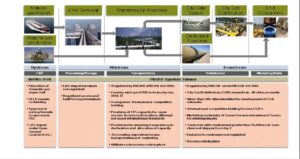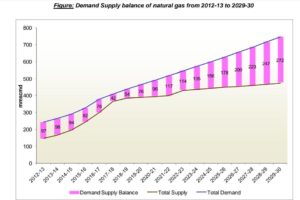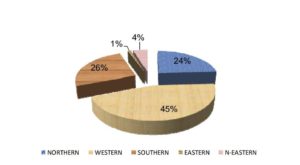Companion@360 → 7 Month programme to sharpen your writing skills → REGISTER NOW
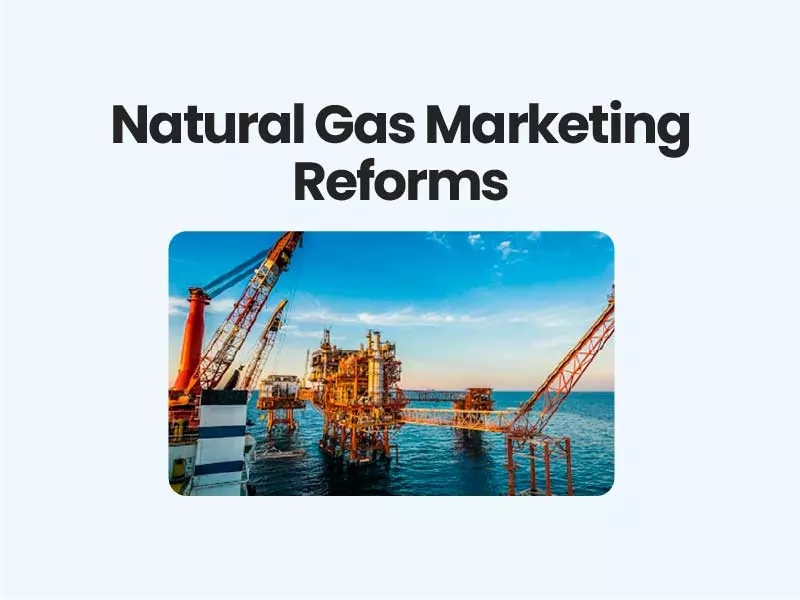
Natural Gas Marketing Reforms
The government brought a series of reforms in Gas sector and as a result investment of more than Rs. 70,000 crore is being made in the East coast. To increase the share of gas in the energy mix from the current 6% to about 15% by 2030, India has bolstered its efforts in making the environment favorable to ensure such an increase. Gas production from East coast will contribute to Atmanirbhar Bharat by meeting the increasing energy needs of the country.
Natural Gas:
- Natural gas is the cleanest fossil fuels among the available fossil fuels
- It is used as a feedstock in the manufacture of fertilizers, plastics, and other commercially important organic chemicals as well as used as a fuel for electricity generation, heating purposes in industrial and commercial units.
- It is a naturally occurring hydrocarbon gas mixture consisting primarily of methane, but commonly including varying amounts of other higher alkanes, and sometimes a small percentage of carbon dioxide, nitrogen, hydrogen sulfide, or helium.
- Natural gas is also used for cooking in domestic households and a transportation fuel for vehicles.
- It is a potent greenhouse gas itself when released into the atmosphere, and creates carbon dioxide during oxidation.
(Natural Gas Chain (India))
Objective of Natural Gas Marketing Reforms policy:
- To prescribe the standard procedure to discover the market price of gas to be sold in the market by gas producers, through a transparent and competitive process.
- Permit Affiliates to participate in the bidding process for the sale of gas and allow marketing freedom to certain Field Development Plans (FDPs) where Production Sharing Contracts already provide pricing freedom.
Significance:
- The policy permitted Affiliate companies to participate in the bidding process in view of the open, transparent, and electronic bidding.
- This will facilitate and promote more competition in the marketing of gas. However, rebidding will have to be done in case only affiliates participate, and there are no other bidders.
- The policy will also grant marketing freedom to the Field Development Plans (FDPs) of those Blocks in which Production Sharing Contracts already provide pricing freedom.
These reforms in the gas sector will further deepen and spur economic activities in the following areas:
- The whole eco-system of policies relating to production, infrastructure and marketing of natural gas has been made more transparent with a focus on ease of doing business.
- These reforms will prove very significant for Atmanirbhar Bharat by encouraging investments in the domestic production of natural gas and reducing import dependence.
- These reforms will prove to be another milestone in moving towards a gas-based economy by encouraging investments.
- The increased gas production-consumption will help in the improvement of the environment.
- These reforms will also help in creating employment opportunities in the gas-consuming sectors including MSMEs.
- The domestic production will further help in increasing investment in the downstream industries such as City Gas Distribution and related industries.
(Region wise gas-based power generation capacity)
Increasing domestic gas production has been a key government priority. Further, the plan to achieve ‘One Nation One Gas Grid’ will shift Indian economy towards a gas-based economy.
A liquid and well-functioning domestic gas market, as also suggested by the International Energy Agency (IEA), would be a strong pillar for building gas economy in India.
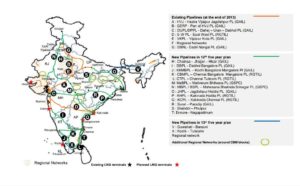
(Infrastructure addition linked to ICF’s NGG proposal and CBM Blocks)
Challenges:
- Differential Pricing
- Public Sector Domination
- Nascent Gas Sector
Way Forward:
- The Government has taken transformative reforms in the upstream sector with a view to making investment easier focusing on ease of doing business.
- The Open Acreage Licensing Policy (OALP) which is an investor-driven acreage auction process, has increased substantial acreages in the country.
- Boosting Infrastructure
- Freeing Gas Markets
- Deregulation of Pricing
Read Also GAIL

